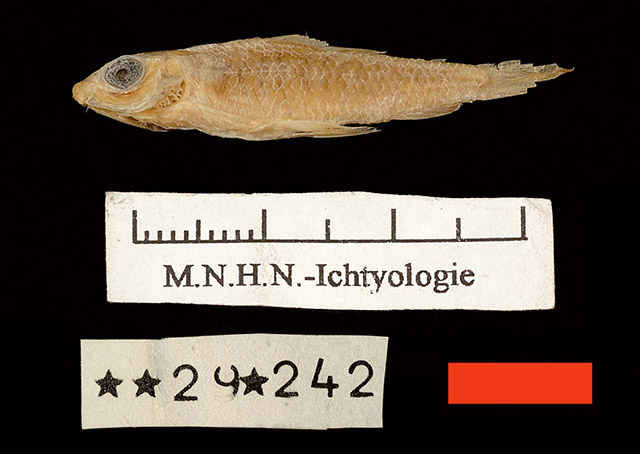| Distichodontidae (Distichodus) |
| 5.8 cm TL (male/unsexed) |
|
pelagic; freshwater |
| Africa: Lower Guinea endemic, only known from the Kouilou River basin in the Republic of Congo (Ref. 81638). |
|
Dorsal spines (total): 0-0; Dorsal soft rays (total): 15-16; Anal spines: 0-0; Anal soft rays: 12-13. Diagnosis: 38-40 lateral line scales; 9-10 branched anal fin rays; mid-lateral pigmentation on body absent or at most irregular and not forming distinct band; dorsal portions of body without distinct vertically oriented dark marks that form saddle-shaped pigmentation pattern (Ref. 81638).
Description: body moderately elongated, depth 0.26-0.28 SL; ventral surface of head somewhat flattened; body rounded anterior to pelvic fin insertion; mouth subterminal, both jaws with single row of bicuspid teeth; maxilla edentulous, premaxilla and dentary each with 4-5 teeth; middle pelvic rays longest and extending to mid-way between vent and anal fin origin; adipose fin present; caudal fin forked with lobes rounded; scales ctenoid and moderately sized; lateral line completely pored in larger specimens with 38-40 scales; juveniles with poring limited to anterior 16-24 scales; 4 scales between anal fin origin and lateral line; D: IV,11-12; A: III,9-10 (Ref. 81638).
Coloration: ground color dark tan; head distinctly darker dorsally and dark on snout and upper lip; patch of dark, separated chromatophores present on regions ventral and posteroverntral of orbit; scattered dark spots present on opercle; scale margins and basal portions of exposed region of scales outlined with dark chromatophores that form reticular pattern; unpigmented region of each scale smaller dorsally; pigmentation along region of overlap of sequential scales darker on lateral surface of body; darker spots along with spots of deeper-lying, dark pigmentation form 10-14 variably defined vertical bars on body becoming less distinct posteriorly; second stripe usually most obvious; fins variably dusky, but without distinct patterns of dark pigmentation (Ref. 81638). |
| Maximum SL recorded is 37 mm (Ref. 81638). |
|
Endangered (EN); Date assessed: 16 February 2009 (B1ab(iii)+2ab(iii)) Ref. (130435)
|
| harmless |
Source and more info: www.fishbase.org. For personal, classroom, and other internal use only. Not for publication.
